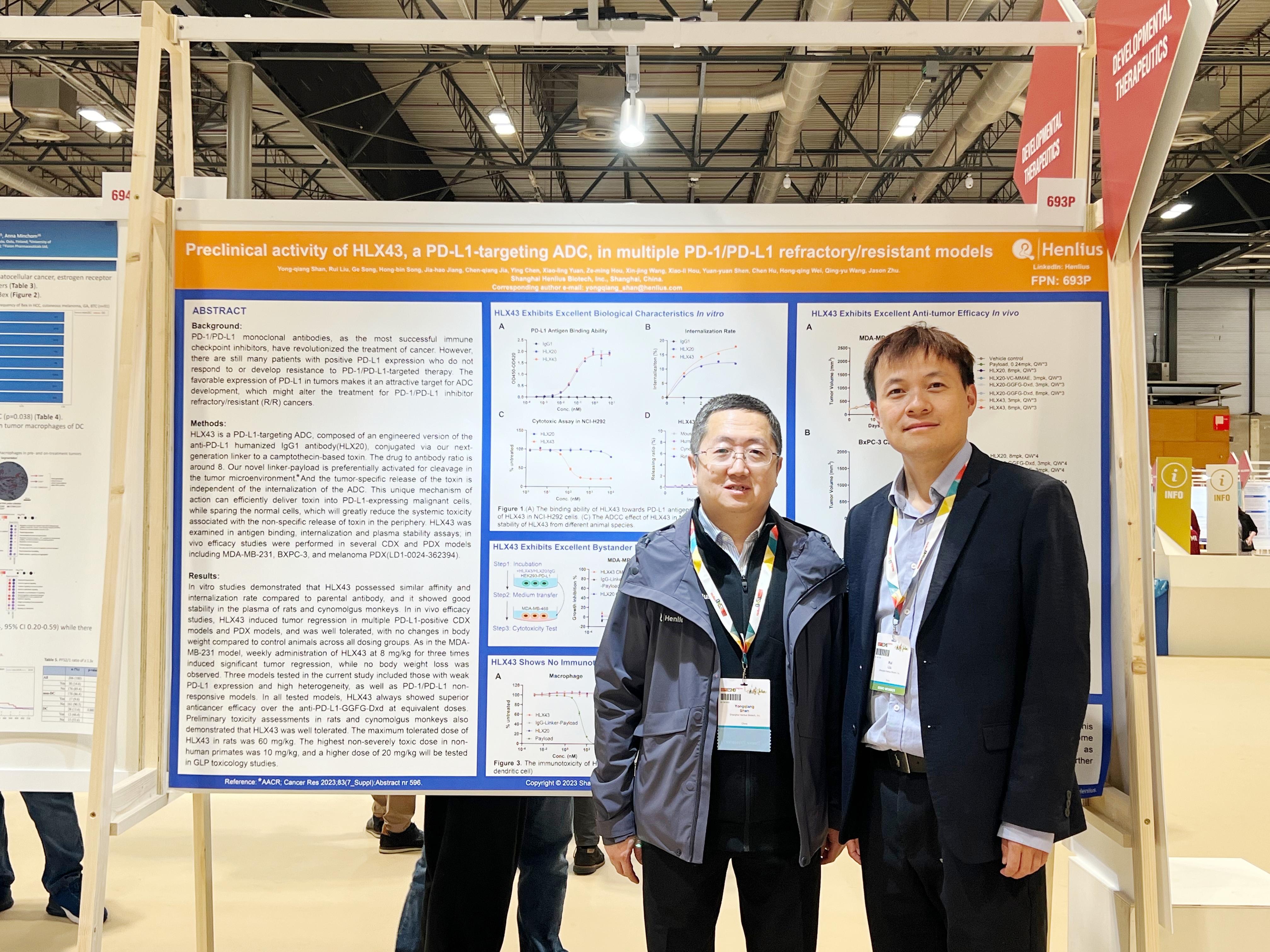Shanghai, China, October 24th, 2023 – Shanghai Henlius Biotech, Inc. (2696. HK) announced that the results from the preclinical study of HLX43, the novel PD-L1- targeting ADC which was developed by the company based on the collaboration with MediLink Therapeutics was released as poster at the 2023 European Society of Medical Oncology (ESMO) Congress.

Immune checkpoint inhibitors represented by PD-1/PD-L1 monoclonal antibodies have emerged in recent years and revolutionized all lines of treatment for tumour patients[1]. However, there are still many patients with positive PD-L1 expression who do not respond to or develop resistance to PD-1/PD-L1-targeted therapy. The favorable expression of PD-L1 in tumours makes it an attractive target for ADC development, which might alter the treatment landscape for PD-1/PD-L1 inhibitor refractory/resistant (R/R) cancers[2]. HLX43 is a PD-L1-targeting ADC, composed of a fully humanized anti-PD-L1 IgG1 antibody, conjugated with a novel topoisomerase-I inhibitor. The drug to antibody ratio(DAR) is around 8. The novel linker-payload of HLX43 is preferentially activated for cleavage in the tumour microenvironment(TME)[3]. This unique mechanism of action can efficiently deliver toxin into PD-L1-expressing malignant cells, while sparing the normal cells. In August 2023, the investigational new drug (IND) application of HLX43 was accepted for review by the National Medical Products Administration (NMPA) of China.
Title
Preclinical activity of HLX43, a PD-L1-targeting ADC, in multiple PD-1/PD-L1 refractory/resistant models.
Methods
HLX43 was examined in antigen binding, internalisation and plasma stability assays; in vivo efficacy studies were performed in several CDX and PDX models including MDA-MB-231, BXPC-3, and melanoma PDX(LD1-0024-362394).
Results
In vitro studies demonstrated that HLX43 possessed similar affinity and internalisation rate compared to parental antibody, and it showed good stability in the plasma of rats and cynomolgus monkeys.
In in vivo efficacy studies, HLX43 induced tumour regression in multiple PD-L1-positive CDX models and PDX models, and was well tolerated, with no changes in body weight compared to control animals across all dosing groups. As in the MDA-MB-231 model, weekly administration of HLX43 at 8 mg/kg for three times induced significant tumour regression, while no body weight loss was observed. Three models tested in the current study included those with weak PD-L1 expression and high heterogeneity, as well as PD-1/PD-L1 nonresponsive models. In all tested models, HLX43 always showed superior anticancer efficacy over the anti-PD-L1 Ab-GGFG-Dxd at equivalent doses. Preliminary toxicity assessments in rats and cynomolgus monkeys also demonstrated that HLX43 was safe.
Conclusion
HLX43 showed promising efficacy and safety results in our preclinical evaluation. This innovative novel PD-L1-targeting ADC has the potential to become a new treatment option for PD-1/PD-L1 inhibitor R/R cancers such as NSCLC, HNSCC, ESCA, SKCM and CRC. Our data warrant further development of HLX43 into the clinical setting.
参考文献
[1]Attili I, Tarantino P , Passaro A ,et al. Strategies to overcome resistance to immune checkpoint blockade in lung cancer[J].Lung cancer: Journal of the International Association for the Study of Lung Cancer, 2021(154-):154.
[2]Kwan B, Ramirez M, Jin S, et al. 783 SGN-PDL1V, a novel, investigational PD-L1-directed antibody-drug conjugate for the treatment of solid tumors[J]. 2021.
[3]Jiaqiang C, Shuai S, Qing Z, et al; Abstract 596: Development and assessment of a novel tumor microenvironment activable linker (TMALIN) ADC platform for solid tumor treatments. Cancer Res 1 April 2023; 83 (7_Supplement): 596.
